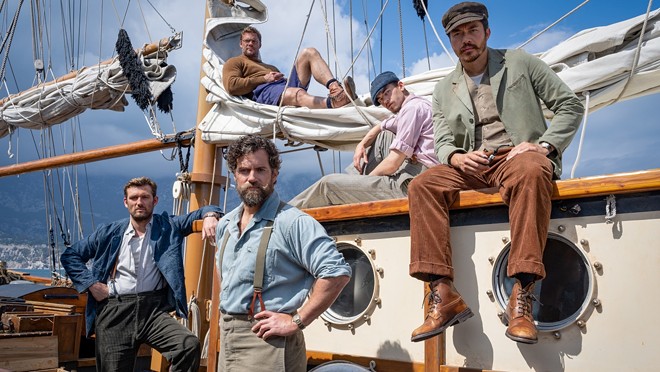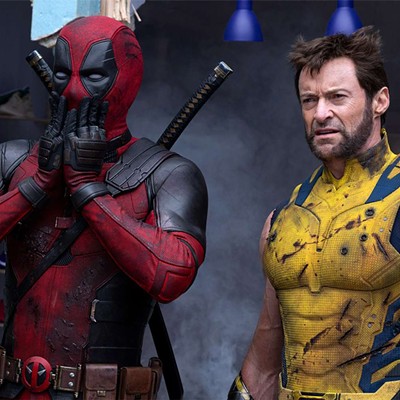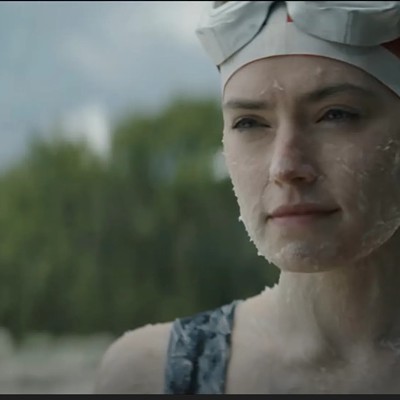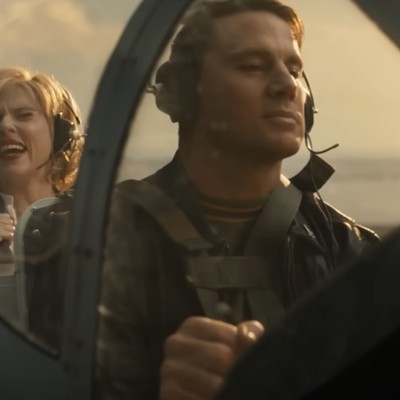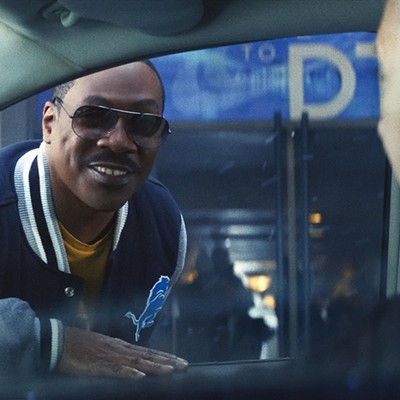Fact-based Ministry a rousing effort
Based on the book of the same name and recently unclassified documents, Guy Ritchie's The Ministry of Ungentlemanly Warfare is the latest fact-based entertainment to hit the big screen. It's 1942 and England is on the ropes in its conflict with the Axis powers. Bombing raids have put the populace on edge, little support is coming from other countries and vital imports are being intercepted by German U-Boats. With a cabinet of advisers who are suggesting he surrender to Hitler, Prime Minister Winston Churchill (Rory Kinnear) is forced to take drastic measures. He orders Brigadier Gubbins (Cary Elwes) and Commander Ian Fleming (Freddie Fox) to create a team of soldiers who will operate outside normal channels to take out the ship that supplies the U-Boat.
The men are a disparate group whose skills manage to complement one another's. Anders Lassen (Alan Ritchson) is a Danish soldier who's a specialist with a knife as well as the bow and arrow, Geoffrey Appleyard (Alex Pettyfer) is an expert strategist, Freddy Alvarez (Henry Goulding) is a whiz at explosives, while Henry Hayes (Hero Fiennes Tiffin) can sail a boat in any conditions. Their leader, Gus March-Phillips (Henry Cavill), has bravado to spare, his courage and foresight indispensable to the success of the mission. While this group travels on an inconspicuous vessel to their destination, agents Majorie Stewart (Eliza Gonzalez) and Alex Heron (Babs Olusanmokun) have gone ahead to gather insight on the Nazi base of operations, led by Heinrich Luhr (Til Schweiger).
While most of today's adventure films contain action set pieces that occur every 15 minutes, Ritchie takes his time before showing his heroes involved in any derring-do. Of course, history dictates this as the group's ocean voyage did take nearly two weeks. However, the film never lags as the director cuts back and forth between the soldiers, headquarters and the advance team, one difficulty after another thwarting their efforts. A run in with a Nazi patrol boat and a prison break help enliven things along the way, while the cat-and-mouse game that ensues between Stewart and Luhr is engaging.
A pithy sense of dark humor suffuses the film, which helps its more gruesome moments go down a bit easier and allows the actors to inject a bit of fun along the way. Wry comments and arched eyebrows abound as Nazis fall to the left and the right, the requisite background of explosions a constant. All involved accord themselves in this area. Warfare won't be mentioned on any list of the greatest war films ever made but it's an enjoyable genre entry buoyed by a smarter-than-usual script, compelling story and well-executed action. That some of the characters were used by Fleming in his James Bond novels will likely generate interest for many to read up on their other real-life exploits. In theaters.
Garland's War a film for all factions
I was worried Alex Garland's Civil War would be cut from the same cloth as John Milius' Red Dawn, the 1984 feature that posited a Russian invasion of the United States was an inevitability rather than a paranoid fantasy. To be sure, Garland's film does, at times, have an air of exploitation about it. But there's more at play here, the director effectively tapping into our collective fear, or desire, of democracy being declared dead and a violent, massive social and political upheaval taking place.
The plot is simplicity itself. Civil war has broken out, led by a coalition known as the Western Forces composed of the unlikely alliance of California and Texas. Veteran war photographer Lee Smith (Kirsten Dunst) has seen her share of armed conflict, her cynicism regarding human nature obvious. Her partner at Reuters, Joel (Wagner Moura), is a capable writer, but also an adrenaline junkie whose recklessness can be a liability. Jessie (Cailee Spaeny) is a rookie photographer who idolizes Lee, her lack of experience constantly putting her in harm's way. Then there's Sammy (Stephen McKinley Henderson), a veteran New York Times reporter who should be sitting behind a desk instead of entering a war zone.
Their trip south has them stumbling upon one tense situation after another. As the journey unfolds, it's against the backdrop of a dying nation. Credit Garland for creating a plausible, nightmarish setting, his cinema verité approach when the characters are in the middle of armed conflict effectively puts the viewer in harm's way, while the unpredictability of the characters' actions creates a sense of palpable tension.
There's nothing new here as far as the examination of human behavior. Most any apocalyptic entertainment features examples of people giving into their basest desires and committing heinous acts once order collapses. But what's different here is the immediacy of the film's context. Without giving any specifics as to why war has broken out or citing any current real-life people who might attempt to foment or prevent it, he's still able to exploit the viewer's fears concerning our current political state.
To be sure, this is easy to do, and while the film's trite ending does it no favors, its realism and sense of urgency make Civil War an effective piece of filmmaking. Is it a cautionary tale? An incitement for revolution? A crass piece of exploitation? I guess, like politics, it all depends on your perspective. In theaters.
Aimless Sasquatch loses its way
Raising children, waiting around at the DMV and being married are all things that, at times, require an inordinate amount of patience. Add sitting through David and Nathan Zellner's Sasquatch Sunset to that list. A well-intentioned but meandering exercise, this family comedy enveloped in a nature documentary parody is a subversive social satire that can't seem to get out of its own way.
Set in the redwood forests of the Pacific Northwest, the film follows the trials and tribulations of a family of four sasquatches over the course of a year. The none-too-bright alpha male (Nathan Zellner) of the group likes to eat, fornicate and pass gas. If he were a human being, he'd be the layabout uncle your mom would tell you to stay away from. The other adult male (Jesse Eisenberg) is more introspective, having learned to hold back and observe while his rival shoots himself in the foot. The child of the group (Christophe Zajak-Denec) is curious, as any youngster would be, staying close to his mother (Riley Keough), the smartest of the four who quietly stands by, aware she will be required to solve any problem her mate creates.
We see them foraging, beating big sticks on trees, interacting with other animals they should be wary of and becoming involved in slapstick situations Laurel and Hardy would be proud of. They bicker, play, help one another with grooming and sometimes take a psychedelic trip if they manage to eat just the right mushroom. And, unfortunately, some of their antics lead to untimely injury and even death.
The first 40 minutes don't necessarily consist of a freeform narrative but there seems to be little going on. Standard incidents of plot aren't at play, simply observation, which is, of course, part-and-parcel of the documentary format. However, those features usually have a narrator informing us of the significance of these actions. Here, these acts play for cheap and tedious laughs.
Eventually the Zellners' intentions are revealed, and what we've witnessed previously is put into some context. What befalls this hairy family proves poignant, their plight inescapable and tragic. In a sense, the overall theme of the film applies to us all and resonates, the movie's last half-hour a genuinely moving and bracing experience.
Unfortunately, early on the Zellners fail to build any goodwill with the audience, toying and manipulating them past the point of endurance. While the filmmakers' sense of humor is welcome, it's the ratio to laughs and pathos that's the problem here. There's too much of the former and not enough of the latter, making Sasquatch an elaborately costumed, missed opportunity. In theaters.

